|
|
|
Sort Order |
|
|
|
Items / Page
|
|
|
|
|
|
|
| Srl | Item |
| 1 |
ID:
085856
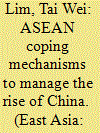

|
|
|
|
|
| Publication |
2008.
|
| Summary/Abstract |
ASEAN has been proactive in reacting to the economic and political challenges of the rise of China without being overly hostile, reactionary or protectionist against China in a conscious effort to co-prosper with China herself. At the same time, smaller ASEAN neighbours of China hope that China will continue to pursue a policy of good neighbourliness. With this background in mind, the thesis questions for the essay are: what are ASEAN's coping mechanisms to manage the rise of China? How do these questions feature into the overall tussle of ideas between realists and non-realists?
|
|
|
|
|
|
|
|
|
|
|
|
|
|
|
|
| 2 |
ID:
142966
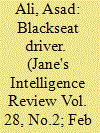

|
|
|
| 3 |
ID:
121907
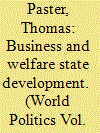

|
|
|
|
|
| Publication |
2013.
|
| Summary/Abstract |
In recent years, employer-centered explanations of welfare state development have begun to challenge conventional labor-centered and state-centered explanations. These new explanations suggest that sector-specific business interests and cross-class alliances propelled the adoption and expansion of social programs (the business interests thesis). This article presents a novel explanation of differences in business support for welfare state expansion based on a diachronic analysis of the German case and shadow case studies of Sweden and the United States. The article suggests that when looking at changes in employers' positions across time rather than across sectors, political constraints turn out to be the central factor explaining variation in employers' support for social reforms (the political accommodation thesis). The article identifies two goals of business intervention in welfare state development: pacification and containment. In the case of pacification, business interests propel social policy expansion; in the case of containment, they constrain it. Business chooses pacification when revolutionary forces challenge capitalism and political stabilization thus becomes a priority. Business chooses containment when reformist forces appear likely to succeed in expanding social protection and no revolutionary challenge exists. The article shows that changes over time in the type of political challenges that business interests confront best explain the variation in business support for labor-friendly social reforms.
|
|
|
|
|
|
|
|
|
|
|
|
|
|
|
|
| 4 |
ID:
125267
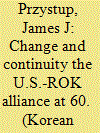

|
|
|
|
|
| Publication |
2013.
|
| Summary/Abstract |
It is important to recognize how successful the U.S.-ROK Alliance has been for the past sixty years in deterring North Korea from attempting to unify the Korean Peninsula by force. This paper addresses Korea's unique status and examines its strong presence in meeting commitments to the international community. The future will require alliance-based cooperation with international partners to address challenges posed by the proliferation of WMD, which is one among many. In the end, however, the U.S.-ROK Alliance will only grow stronger, enhancing stability and security on the Peninsula.
|
|
|
|
|
|
|
|
|
|
|
|
|
|
|
|
| 5 |
ID:
150942
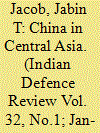

|
|
|
| 6 |
ID:
126802
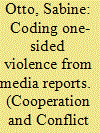

|
|
|
|
|
| Publication |
2013.
|
| Summary/Abstract |
Event datasets on political violence, which are comprised of coded collected news reports, have enjoyed a renaissance within the academic community. The inclusion of civilian fatalities within these datasets is a promising and welcomed advancement regarding the availability of data on one-sided violence. However, these datasets are often criticised due to their heavy reliance on media records, which may be tainted by biases. So far, little attention has been paid to the specific problems that arise in the coding procedure with respect to one-sided violence. This article addresses such difficulties by discussing particular challenges presented by media biases and by providing empirical evidence from coding one-sided violence. Furthermore, solutions and strategies are offered to the issues that could affect the coding process, including increased transparency, definition-adaptation, and the use of appropriate statistical models.
|
|
|
|
|
|
|
|
|
|
|
|
|
|
|
|
| 7 |
ID:
130898
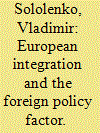

|
|
|
|
|
| Publication |
2014.
|
| Summary/Abstract |
"European integration has progressively moved forward through crisis." "Europe always emerges stronger after a crisis." "Without previous crises, the European Union would not have reached the advanced stage it is at today." Across EU history we have heard such slogans from European heads of state or government, EU officials, and scholars too. They tend to sing the 'Europe moves forward through crisis' refrain almost in tune whenever the next EU challenge comes along. The chorus has swelled to new volumes with the onset of the European sovereign debt crisis.
|
|
|
|
|
|
|
|
|
|
|
|
|
|
|
|
| 8 |
ID:
130899
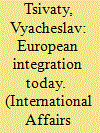

|
|
|
|
|
| Publication |
2014.
|
| Summary/Abstract |
It so happens that we are witnesses to the great geopolitical changes, where one political and economic system is replacing another, where the boundaries of political regions and alliances are shifting, and where the system of international relations is institutionalizing, integrating and transforming. A key characteristic that defines the development vectors of countries in the post- Soviet space is the search by newly independent states for an attractive integration nucleus. On the whole, from all indications, the process of the formation of a more or less stable system of foreign political ties between the post-Soviet states is complete. This accounts for the prevalence of the selective integration vector, namely, the fact that collaboration along the lines of the Customs Union and the EU has taken center stage.
|
|
|
|
|
|
|
|
|
|
|
|
|
|
|
|
| 9 |
ID:
134109
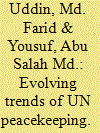

|
|
|
|
|
| Publication |
2014.
|
| Summary/Abstract |
Peacekeeping has emerged as one of the core activities of the United Nations (UN). Due to ground realities, the doctrines, principles and structures of peacekeeping have evolved in accordance with necessity. In the traditional phase, during the Cold War era, peacekeeping was mostly limited to monitoring and observation affairs. In the post-Cold War era, there was an expansion of peace operations and "minimum use of force", where necessary, emerged as an acceptable norm of peacekeeping. In the consolidation phase, after 2000, peace operations emphasised on peace building affairs i.e., democratisation, institution building, security sector reform (SSR) and human rights protection. The phase of New Horizon, which started in 2009 indicating changing trends, focuses mainly on development, capacity building, planning and oversight. It can be argued that the future peace operations are going to be more robust and multidimensional, and would concentrate on responsibility to protect civilians, human rights and environmental issues, gender mainstreaming, democratisation and institution building to achieve sustainable peace in the conflicting areas. Being a leading troops contributing country, Bangladesh will face new challenges to adapt with the emerging trends of UN peace operations. The challenges include dealing with new doctrinal issues and capacity building of its peacekeepers in the field level. In this respect, the main objectives of this paper are to understand the changing trends of UN peacekeeping and to identify potential challenges for Bangladesh and its likely responses in the coming days to continue its contributions in the UN peace operations.
|
|
|
|
|
|
|
|
|
|
|
|
|
|
|
|
| 10 |
ID:
133238
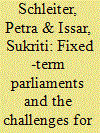

|
|
|
|
|
| Publication |
2014.
|
| Summary/Abstract |
The Fixed-term Parliaments Act significantly reduces the powers of the Prime Minister to manage the risk of government termination and to time elections to his or her party's advantage. In this paper we ask how the Act is likely to change the way in which governments terminate, their durability and opportunities for planning in government and departments. In answering these questions we draw on quantitative comparative evidence from other European countries that operate with fixed-term parliaments. Our analysis suggests that fixing the parliamentary term can be expected to convert some opportunistically called elections into regular elections and to stabilise governments toward the end of the parliamentary term. But the Act is also likely to have unanticipated consequences in increasing governments' vulnerability to failure before they reach the final sessions of Parliament. We explore these unanticipated consequences and outline their implications for governing style and Civil Service planning
|
|
|
|
|
|
|
|
|
|
|
|
|
|
|
|
| 11 |
ID:
125582
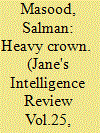

|
|
|
|
|
| Publication |
2013.
|
| Summary/Abstract |
Since coming to power in early June, the government of Nawaz Sharif has struggled to deal with the challenges posed by pro-Taliban militants, Salman Masood reports from Islamabad on the Pakistani prime minister's troubled inheritance.
|
|
|
|
|
|
|
|
|
|
|
|
|
|
|
|
| 12 |
ID:
131991
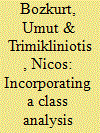

|
|
|
|
|
| Publication |
2014.
|
| Summary/Abstract |
This article has two main aims. First, it aims to challenge the widespread narrative in Cyprus studies that presents ethnic identities as historically inevitable and natural. Rather, identities need to be conceptualized as socially constructed. The second aim of this article is to problematize the argument that ethnic or national groups are homogenous actors. It underlines the need to deconstruct these supposedly unitary actors by making use of a class-based conceptualization of the state. By using such a conceptualization, the article will focus on the period between 1878 and 1974. It will start with a concrete analysis of the class structure in the Cypriot society and then will trace how different classes in both communities positioned themselves vis-à-vis political structures of power and how these positionings paved the way to the division of the island.
|
|
|
|
|
|
|
|
|
|
|
|
|
|
|
|
| 13 |
ID:
137462
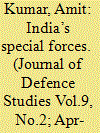

|
|
|
|
|
| Summary/Abstract |
At a time when the battlefield has been progressively transforming from the conventional to unconventional, the role of Special Forces will become critical in shaping its outcome. Conflicts in the past decade have established the primacy of such forces. Their role has evolved and today special operations are meant to be decisive and achieve strategic objectives. The Indian security establishment has also been taking notice of these changes and by and large making right moves. As India embarks on the path of high economic growth and becomes a power to reckon with, its troubled neighborhood poses the biggest challenge to it. The role of Special Forces will thus be critical in outwitting adversaries’ moves in the neighborhood and areas of India’s strategic interests, and in promoting India’s security.
|
|
|
|
|
|
|
|
|
|
|
|
|
|
|
|
| 14 |
ID:
128534
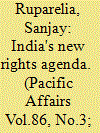

|
|
|
|
|
| Publication |
2013.
|
| Summary/Abstract |
Since 2004, India has introduced a series of progressive national bills that enact a right to new civic entitlements, ranging from information, work and education to forest conservation, food and basic public services. What explains the emergence of these laws? How are the rights conceived by these acts conceptualized, operationalized and pursued? What are the promises, challenges and risks-legal, political and economic-of enshrining socioeconomic entitlements as formal statutory rights? This paper engages these questions. In part 1, I argue that three slow-burning processes since the 1980s, distinct yet related, catalyzed India's new rights agenda: high socio-legal activism, rapid uneven development and the expanding popular foundations of its federal parliamentary democracy. Significantly, all three processes exposed the growing nexus between political corruption and socioeconomic inequality. Equally, however, each raised popular expectations for greater social justice that were only partly met. Part 2 of the paper evaluates India's new rights agenda. The promise of these new laws is threefold: they breach the traditional division of civil, political and socioeconomic rights, devise innovative governance mechanisms that enable citizens to see the state and provide fresh incentives for new political coalitions to emerge across state and society. Several risks exist, however. Official political resistance from above and below, the limited capacities of judicial actors, state bureaucracies and social forces and the relatively narrow base of many of these new movements endanger the potential of these reforms. The paper concludes by considering several imperatives that India's evolving rights movement must confront to realize its ambition.
|
|
|
|
|
|
|
|
|
|
|
|
|
|
|
|
| 15 |
ID:
133481
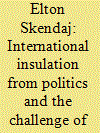

|
|
|
|
|
| Publication |
2014.
|
| Summary/Abstract |
Can international actors build effective state bureaucracies in postwar countries? While the literature on state institutions suggests they are best built under local ownership, this article shows how international actors in collaboration with local actors managed to build two effective state bureaucracies in postwar Kosovo: the police force and the customs service. Contrary to the article's Hypothesis 1 on local ownership, international actors insulated the effective bureaucracies from political and societal influences in order to prevent them from becoming sites of patronage. Thus, these institutions built on meritocratic recruitment and promotion. Employing a comparative research design, the article utilizes national survey data as well as data from 150 semistructured interviews conducted during ten months of fieldwork in Kosovo. By contrasting the state's constituent bureaucracies, which vary in effectiveness, and thus avoiding the reduction of the state to a unitary abstract actor, this research offers a fresh perspective on postwar state building. Furthermore, it contributes three innovative sets of indicators to measure effective bureaucracies: mission fulfillment, penalization of corruption, and responsiveness to the public.
|
|
|
|
|
|
|
|
|
|
|
|
|
|
|
|
| 16 |
ID:
127591
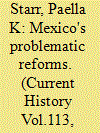

|
|
|
|
|
| Publication |
2014.
|
| Summary/Abstract |
President Enrique Peña Nieto's first year in office (he was inaugurated in December 2012) was impressive, but also disappointing. The new administration's legislative achievements, including a series of long-awaited economic reforms, were striking in both number and content. Yet these accomplishments were accompanied by severely compromised fiscal and political-electoral reforms, an absence of anticorruption legislation, a sharp economic downturn caused mainly by government missteps, and a lack of sustained policy attention to the country's security situation. For the Mexican public, these last two failings weigh much more heavily on their everyday lives than the potential benefits from reforms approved by politicians who rarely seem to legislate with the citizenry in mind. Opinion polls show the lowest public support for any presidential administration in decades.
|
|
|
|
|
|
|
|
|
|
|
|
|
|
|
|
| 17 |
ID:
149517
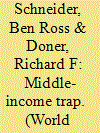

|
|
|
|
|
| Summary/Abstract |
Economists have identified the existence of a middle-income (MI) trap but have yet to analyze the politics of this trap. The authors argue that countries in the MI trap face two major institutional and political challenges. First, the policies necessary to upgrade productivity—as in human capital and innovation—require enormous investment in institutional capacity. Second, these institutional challenges come at a time when political capacity for building these institutions is weak, due primarily to the fragmentation of potential support coalitions. Politics are stalled in particular by fractured social groups, especially business and labor, and more generally by inequality. These conditions result in large measure from previous trajectories of growth. The empirical analysis concentrates on nine of the larger MI countries.
|
|
|
|
|
|
|
|
|
|
|
|
|
|
|
|
| 18 |
ID:
128865
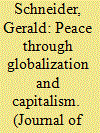

|
|
|
|
|
| Publication |
2014.
|
| Summary/Abstract |
The security externalities of globalization and capitalism continue to play an influential role in peace research. Typical contributions to these interrelated areas of scientific inquiry address the hope that the external openness (commercial liberalism) and the internal freedom of an economy (capitalist peace) pacify interstate as well as intrastate relations. I claim, despite the empirical support both theses have received, that they face considerable analytical hurdles. Commercial liberalism has, on a theoretical level, not yet moved much beyond the opportunity cost arguments that enlightenment philosophers first advanced more than 200 years ago. The capitalist peace research program similarly does not offer clear micro-level mechanisms explaining why the interactions between economic agents and political decisionmakers should be more peaceful in capitalist than in state-dominated economies. Drawing on the political economy literature, I argue that economic liberalism should distinguish between level- and change-effects of both globalization and capitalism and that thinking in analogies between domestic and interstate peace has prevented the field from making analytical headway. Both literatures will only profit from the advent of 'big data' in the case that the field addresses the theoretical challenges upfront.
|
|
|
|
|
|
|
|
|
|
|
|
|
|
|
|
| 19 |
ID:
131142
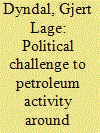

|
|
|
|
|
| Publication |
2014.
|
| Summary/Abstract |
The petroleum industry has greatly increased its activities in the Arctic, and nations are eager to award new licences for further hydrocarbon exploration and exploitation. The European High North has become a sought-after region in this regard, and recent discoveries in the Hoop High fields and other areas along the edge of the maritime zone around the Svalbard archipelago have again created debate about the underlying judicial and political challenges that may spark international conflict. Gjert Lage Dyndal discusses the disputed status of the area and argues that the petroleum industry may prove central to a compromise solution.
|
|
|
|
|
|
|
|
|
|
|
|
|
|
|
|
| 20 |
ID:
143479
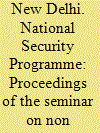

|
|
|
|
|
| Publication |
New Delhi, Jawaharlal Nehru University, 1988.
|
| Description |
55p.pbk
|
| Series |
National Security Series; 3
|
|
|
|
|
|
|
|
|
|
|
|
Copies: C:1/I:0,R:0,Q:0
Circulation
| Accession# | Call# | Current Location | Status | Policy | Location |
| 029616 | 355.033054/NEW 029616 | Main | On Shelf | General | |
|
|
|
|
|
|
|
|
|